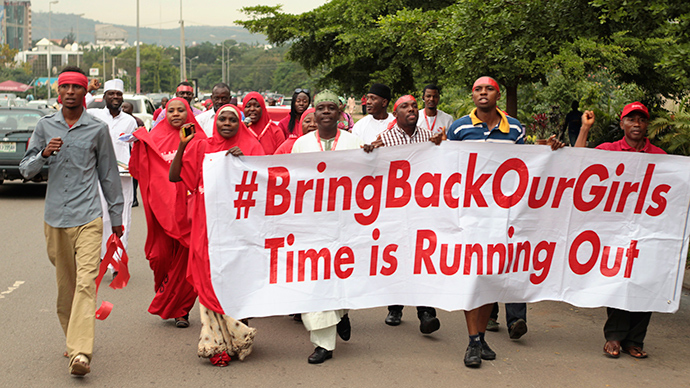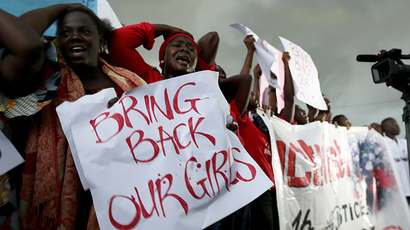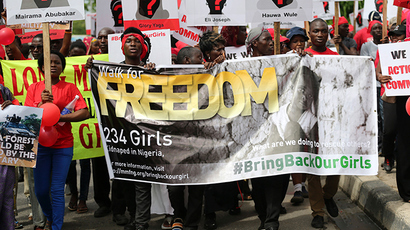Nigerian schoolgirls 'to be released', ceasefire reached with Boko Haram

The roughly 200 schoolgirls kidnapped by the Boko Haram militant group months ago will be released as part of a larger ceasefire, the Nigerian government announced on Friday.
There is no timetable regarding the girls’ release, however, and Nigerian government spokesperson Doyin Okupe said they will not all be freed at the same time.
"A batch of them will be released shortly, and this will be followed by further actions from Boko Haram," he told CNN. "It is a process...It is not a question of hours and days."
The agreement was reached after three days of negotiations between Nigerian officials and Boko Haram, Reuters reported. The ceasefire pact was apparently finalized after the government made concessions to the militants, though it is currently unclear what those exactly included.
The girls could be freed by Tuesday, a senior source at the Nigerian president’s office told Reuters on Saturday, although he declined to give details on how it would be done.
"I can confirm that FG (the federal government) is working hard to meet its own part of the agreement so that the release of the abductees can by effected either on Monday or latest Tuesday next week," the source said.
We are monitoring the news with huge expectations http://t.co/L01FrUFKwz#BringBackOurGirls
— #BringBackOurGirls (@BBOG_Nigeria) October 17, 2014
Experts have, however, been cautious about statements made by the Nigerian government, as in the past various officials have made conflicting announcements on the same issues.
This time, the government statement has been doubted by Nigeria's chief security spokesman, Mike Omeri, who told AFP that the deal on the girls release “has not been agreed but we are inching closer and closer.”
The US has been wary in commenting on the situation, saying that it could not confirm whether the Nigerian government and Boko Haram have reached a deal on the kidnapped girls.
"Obviously, we would welcome an end to hostilities, a restoration of security and, I think it should go without saying, would welcome the release of those girls that have been gone far too long. But we cannot independently confirm that at this point," said State Department spokeswoman Marie Harf.
The Nigerian government has been battling Boko Haram – which has persecuted everything related to Western education and has also waged a bloody insurgency within the country – since 2009. The group increased its attacks northeastern Nigeria this year, and just this past August seized the town of Gwoza, declaring it part of their “Islamic Caliphate.”
More than 2,000 civilians were killed in the first half of this year, according to Human Rights Watch. Amnesty International, meanwhile, pegged the number closer to 4,000.

Boko Haram alone has been blamed for more than 10,000 deaths since 2009.
The group made global headlines when it kidnapped the schoolgirls from Chibok in April. The group’s leader, Abubakar Shekau, prompted strong backlash when he said he would sell them in the market. Scores of girls have managed to break free, but most are still in captivity.
Despite the announcement that the children would be let go, many remain skeptical – particularly since Boko Haram has yet to comment on the news. As noted by the BBC, past comments by the military have turned out to be wrong.
"There are some talks but it depends on the buy-in of the whole group. I would be surprised if Shekau had suddenly changed his mind and is ready for a ceasefire," an unnamed Nigerian security source told Reuters. The source added that it still needs to be confirmed whether Shekau was part of these negotiations, or if Nigerian officials were talking to other people within Boko Haram.
Still, the source said it would be a good idea to test the militants’ willingness to follow through on the pact.
"Commitment among parts of Boko Haram and the military does appear to be genuine,” the source said. “It is worth taking seriously.”
Our prayers are with the missing Nigerian girls and their families. It's time to #BringBackOurGirls. -mo pic.twitter.com/glDKDotJRt
— The First Lady (@FLOTUS) May 7, 2014
The capture of the school girls sparked an international campaign calling for their release, dubbed “#Bring Back Our Girls.” A number of high-profile individuals participated in the effort, including Michelle Obama. The First Lady of the United States posted a photo of herself posing with a sign that carried the hashtag name of the campaign, and the image was promptly shared tens of thousands of times online.
Boko Haram responded directly to the social media campaign, with Shekau himself declaring in a video: “You have been running around saying, ‘Bring back our girls,’...Bring back our Army! Jonathan! Bring back our Army!”
READ MORE: 'My husband kills kids with drones': Michelle Obama's viral pic fuels anti-drone campaign














